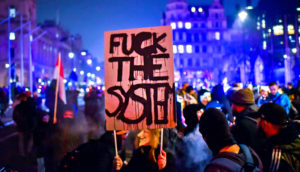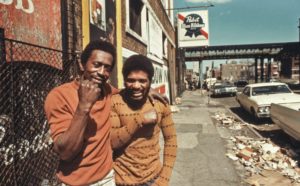A number of intolerant ideologies have swept through the worlds of learning, literature and the visual and performing arts over the past two decades. I am concerned with one of them. Its essential feature is the diversion of academic disciplines to a task for which they are usually ill-suited, namely the reform of modern society so as to redress perceived inequalities, notably of race. In the course of this exercise, some of these disciplines have been discredited and others distorted, generally with little or no factual basis. The study of history is particularly vulnerable. Most historical scholarship involves judicious selection from a vast and usually incomplete body of material. It is possible to create an entirely false narrative without actually lying, by exaggeration and tendentious selection. The major threat to historical integrity comes when the criteria of selection are derived from a modern ideological agenda. We have been witnessing the reshaping of the history of the past four centuries to serve as a weapon in current political disputes. Objectivity and truth have been the main casualties.
In November 2022, the Wellcome Collection, a museum dedicated to the history of medicine, announced the closure of Medicine Man, an exhibition of artefacts relating to the history of medicine collected by its founder Sir Henry Wellcome. The decision to close this exhibition was itself perfectly reasonable. As a collector, Sir Henry Wellcome was a bit of a magpie, and the exhibition, which was 15 years old, was rather fusty. However, what mainly attracted attention was the statement which the curators published on Twitter that they had closed it because it “perpetuates a version of medical history that is based on racist, sexist and ableist theories and language”. To understand this statement, it is necessary to go back two and a half years to an earlier announcement from the Wellcome Collection in June 2020 in the aftermath of the murder of George Floyd in Minneapolis. Under the heading “Anti-Blackness and Racism”, it declared that the Collection was built on “racist and patriarchal narratives” and that institutional racism was enmeshed within its fabric. It went on to suggest that not only the Wellcome Collection but museums generally were “built on a foundation of white supremacy” and had replicated “racist behaviours” for decades. The curators declared their intention of “continually ask[ing] questions about power, representation and the civic role of public museums” and focussing on the “lived experiences of those who have been silenced, erased and ignored”.
What does all that mean? It is palpably untrue that medical history, as presented in Medicine Man, was based on racist, sexist and ableist theories. Certainly, museums reflect the historical outlook of those who assembled their collections and their successors who curated them. In Britain, they were generally able-bodied white males. But museums do not, just by virtue of that fact, replicate racist behaviours. Nor does our culture silence or ignore non-European experience where it is relevant. I think that what the curators meant to say was that the exhibition treated medicine as a western science of which non-white groups were passive consumers with no worthwhile contribution of their own. This, they felt, implied a hierarchy of cultures in which the west was superior to the rest, a notion which was offensive to non-western racial groups.
The Wellcome Collection is not alone. The Museum Association, which represents museums generally, has called on them to “address colonial structures and approaches to all areas of museum work”. At about the same time as the curators of the Wellcome Collection published their June 2020 statement, the Director of the Royal Botanical Garden at Kew, probably the world’s leading institution dedicated to plant science, issued a similar statement on its behalf. He began with the usual cringing confession that its history “shamefully draws from a legacy that has deep roots in colonialism and racism”. The only fact cited to support this surprising assertion is that during the nineteenth century, the Royal Botanical Garden studied the movement of plants around the British Empire as part of its world-wide botanical mission. This is said to have made the Botanical Garden at Kew a “beacon of privilege and exploitation”. The director went on to declare that Kew would in future decolonise its collections and “tackle structural racism in plant and fungal science”, with a view to achieving “transformative and societal change” in modern Britain. The inference is that merely by having existed and collected information and specimens in the great age of imperialism Kew Gardens is in some way complicit in modern inequalities in Britain. Finally this. “There is no acceptable neutral position on this subject [racial injustice;]; to stay silent is to be complicit”. This is a particularly odd thing to say. It seems obvious that one can be an excellent plant scientist and an outstanding plant historian without taking any view at all on racial injustice.
These statements have certain points in common.
The first is that they are proposing a political program for the modern day, supported by a highly selective approach to the past which sees everything through the prism of race. Race becomes the supremely important phenomenon, masking every other aspect of a complex culture. Racial politics provide the framework of values by which every institution concerned with the past is to be judged. There are many important factors in the way that human societies develop. Race is only one of them and not necessarily the most important. Any serious commentator on the current state of historical studies ought to welcome attempts to present aspects of history which have previously been ignored or marginalised. That includes the story of ethnic minorities and non-European societies. But it does not mean that the whole of Britain’s modern history should be viewed through their eyes. It does not mean that the role of slavery or empire in Britain’s economic, cultural and social history should be exaggerated beyond recognition. And it does not mean that current political priorities should determine how we understand the past.
The second thing these statements have in common, is that they lose sight of the broader evolution of human history. Benjamin Disraeli once observed in response to an antisemitic taunt in the House of Commons, that “while the ancestors of the right honourable gentleman were brutal savages in an unknown island, mine were priests in the temple of Solomon”. Victorian elites undoubtedly regarded their own civilisation as superior to others. This been a universal habit of humanity ever since the Greek city-states and the ancient dynasties of China dismissed the whole of the rest of the world as barbarians. If these prejudices are ever justified, it is only for short periods of time, two or three centuries at the most. Empires and cultures are transient. They have their periods of power and creativity, before fading away. Medicine is as good an example as any. White males have not always dominated medical science. There have been periods when major contributions came from non-European cultures: Chinese, Indian and Arab in particular. Historians have not ignored this. Great books have been written about it, almost all in European languages. The 26 volumes of the History of Science and Technology in China by the Cambridge scientist and historian Joseph Needham is one of the most remarkable works ever written on the multicultural origins of modern science. But this should not blind us to the fact that the three centuries before the Second World War were the European centuries, in medicine as in other sciences.
With very few exceptions, such as the use of some medicinal plants, indigenous non-Europeans contributed very little. If one looks across a broader chronological range, the picture is very different. But calls for the decolonisation of academic disciplines do not do that. They generally focus narrowly on the 18th and 19th century and seek to debunk one of the few indisputable facts about that period, namely that it was a period in which cultural and scientific developments fundamental to the modern world almost all emanated from Europe or from European settlements elsewhere.
Decolonisation has been demanded of many other disciplines which were never in any meaningful sense colonised: the visual arts, music, literature, philosophy and even the physical sciences and mathematics. The only connection between these fields of study and Europe’s imperial past is that the West achieved a dominant position in them during the imperial era. The decolonisation statement of the Mathematical, Physical and Life Sciences Division at Oxford reveals the same obsession with race and the same tendentious attempt to portray racism as a perennial theme of western thinking. It begins by seeking to discredit its own subject by referring to the scientific racism of the 19th century, which posited a racial hierarchy identified by physiological characteristics, a view which no serious scientist has entertained for many decades and which has no current relevance to the subject.
It goes on to identify science with empire by pointing to the Victorians’ collection of material samples and botanical specimens across the globe. Moving to the present day, it calls for a study of deep-rooted racial biases in digital technology, artificial intelligence and machine learning. One would not have thought that the subject was capable of racial bias. But as the statement proceeds, it becomes clear that the object is to redefine knowledge itself, in a way which artificially devalues western science. “As we work towards greater inclusion”, it declares, “we need to have a broader understanding of what constitutes ‘scientific knowledge’. Among other things, this is said to involve “challenging western-centric ideas of ‘objectivity’, ‘expertise’ and ‘merit’”, and “removing structural hierarchies that privilege certain knowledge and certain peoples over others”. It is clear that the authors of this document believe that the empirical scientific method as conceived in the west since the 17th century is just one of a number of equally valid approaches to the subject, and that it is racially biased to prefer this to any other.
There are two basic ideas behind statements like these. One is about the nature of historical truth. The other is about inherited collective guilt.
The repeated emphasis on challenging the structures of power is an echo of the teaching of postmodernist philosophers such as Michel Foucault. Foucault was the leading exponent of the idea that objective truth is unattainable, because truth is by nature subjective. In The Archaeology of Knowledge (1969), he taught that the structures of power within a society determine what is generally perceived to be true. Few people outside the discipline of philosophy have read Foucault’s opaque works. But many more have read Edward Said’s influential book Orientalism, published in 1978, which applied Foucault’s ideas to the legacy of the great European empires. Said argued that powerful groups control the intellectual framework within which ideas are discussed and determines what constitutes knowledge. Historical truth, he claimed, is not discovered. It is made by historians, in accordance with unconscious prejudices moulded by the power structures of society. The power structures which had enabled Europeans to dominate much of the world between the 18th and the 20th centuries had generated a view of the world based on a hierarchy of civilisations which patronised and marginalised non-European peoples. According to Said, this frame of mind persisted. It led modern scholars to construct a narrative of the past which treated non-western races as representing an earlier stage of human evolution, less valid than the more developed experience of the modern west. The task of the historian was therefore to deconstruct the hegemonist West and substitute a different power structure in which other people’s truth could be acknowledged.
These ideas have been extremely influential among many people who know nothing of their origin and have never heard of Foucault or Said. In 2015, the organisers of the campaign to remove the statue of Cecil Rhodes from its niche outside Oriel College issued a pamphlet entitled Our Aims. Their purpose, it said, was to suppress the frame of mind which the statue symbolised. It was to “remedy the highly selective narrative of traditional academia—which frames the West as sole producers of universal knowledge—by integrating subjugated and local epistemologies…” When, three years ago, the Director of the Pitt-Rivers Museum decided to ask a Maasai shaman to divine which objects from the Maasai collections of the museum had been stolen from their original owners and to repatriate the items that he designated, she was giving practical effect to the idea that modern historical and archaeological methods are no more valid as a route to truth than mystical divination employed in other cultures. If truth is subjective, then every ethnic group may have its own truth, and the whole concept of objective knowledge disappears.
As for inherited collective guilt, the argument is that if people once suffered what we now regard as injustice at the hands of our forebears, we owe it to their descendants to make that good. One thing that the study of history teaches us is that injustice as we conceive it has been the lot of much of humanity at most times. Much of the history of the world is a history of the brutal exercise of force: tyrannies, wars, massacres, persecutions. Historically, most people at most times have abhorred democracy, rejected political and religious tolerance and regarded the very idea of gender or racial equality as ridiculous. What should we do about this now that we think differently?
Logically, perhaps, humanity at large ought to atone for its own past. But at that level of generality, the gesture would be largely meaningless. After all, injustice is indiscriminately distributed across the centuries and continents. It would deprive what is really a political program of its political force. So the call for atonement for heritable guilt is directed against some specific sector of humanity, say, white people, the British or Oxford University. This is not only irrational. It is also morally repellent. Historically, the idea that particular groups bear an inherited responsibility for some past iniquity has been the basis of ugly prejudices and vicious persecutions.
The desire to visit moral responsibility for the past on some identifiable sector of mankind has generally focused selectively on Britain’s involvement with empire and slavery. No one would today defend the worst moments of the British Empire: the rapacity of the East India Company before its political and military operations were brought under government control at the end of the 18th century; the Opium wars; the Amritsar massacre, and so on. But it is a gross offence against historical honesty to take all the worst features of some historical phenomenon and then serve them up as if they were the whole.
Throughout history, empire and armed migration have been part of the dynamic of human development. The values which we regard as characteristic of western civilisation were born in the societies of ancient Greece and Rome both of which were founded on slavery and imperial conquest. The bloody conquests of the Arabs in the seventh and eights centuries gave rise to a remarkable middle eastern civilisation, far more impressive than anything to be found in Europe in the same period. The rise of modern Japan as a technical and industrial giant had its origin in the forcible opening up of the “hermit isle” in the 1850s by the American navy. The European colonial empires between the 16th and the 20th centuries had the same catalytic effect on the world.
The British Empire was created and sustained by force or the threat of it, as all empires, indeed all governments, ultimately are. It denied self-determination to its indigenous populations until its final years. Yet it was also a remarkable administrative and cultural phenomenon. Those who governed it were guided by a variety of motives, patriotic, economic, military, geopolitical, evangelical. But at least in the last century and a half of the empire’s existence they were also infused with a strong streak of humanitarianism and idealism. The empire suppressed a variety of barbarous practices which it would have been convenient to tolerate, including cannibalism, suttee, human sacrifice and slavery. It brought spectacular economic development, creating global networks of shipping, railways and telegraph and injecting capital and enterprise into local economies. It brought relative peace, honest administration and the rule of law to much of the world. It built great world cities: Mumbai, Hong Kong, Singapore, Sydney.
Our forebears believed that good government was better than self-government, and that trade and economic development were better than cultural autarky. These are unfashionable views now, but there is nothing inherently disreputable about them. Would sub-Saharan Africa be better off today if Europeans had left its peoples to their own devices? Would modern India be better off if it had not inherited its subcontinental identity and economic infrastructure from Britain? Would the world as a whole be a better place if Europeans had never settled in the Americas or Australia? I do not think so.
Slavery was once among the most ancient and persistent institutions of mankind. The Arabs and the indigenous rulers of precolonial Africa were probably the greatest slavers who ever existed. The involvement of the Atlantic nations is, by comparison, relatively recent. It began with the Portuguese in the 15th century and the Spanish in the 16th. Britain was the last country to take to slave trading and the first country to reject it. In societies imbued by Christian moral teaching, slavery was only defensible on the footing that black people were not really human. In the late 18th and early 19th century, the rise of evangelical Christianity in Britain led to a major movement of moral revulsion against that idea. In 1772, the Court of King’s Bench declared that the English common law did not recognise property in another human being. The slave trade was criminalised throughout the British Empire in 1807, earlier than any other country except Denmark. Slavery itself was abolished by statute throughout the empire in 1834.
For the remainder of the 19th century, Britain deployed its considerable diplomatic and naval power in suppressing the practice, initially on the Atlantic coasts of Africa, then in the African interior and the Indian ocean. The polemics surrounding Britain’s involvement in the slave trade concentrate on its participation in the 17th and 18th century slave trade while ignoring or belittling its involvement in the suppression of the trade. Yet historically the latter was very much more significant. The 17th and 18th century slave trade was in line with the conventional moral values of the age. But its suppression was revolutionary. It went against the tide of opinion elsewhere in Europe and against Britain’s economic interest. The global consequences were immense. The sheer size and global reach of Britain’s colonial empire was the biggest single factor in the suppression of a practice that had existed across the world from time immemorial.
To many people, all this is beside the point. Their real concern is with the present, and with those aspects of the past which serve their arguments about the present. Their anger against the past is provoked by a small number of totemic issues, of which race and empire are the most sensitive. These issues are totemic because the position which one takes on them is seen as a symbolic statement of which side one is on in the broader battle to shape the future. When an issue acquires totemic status, the actual facts disappear from view. The issue becomes a mere occasion for political self-expression. Hence the vandalism of statues and the campaigns to rename streets and buildings.
The statue of Edward Colston in Bristol was erected to honour his foundation of schools, hospitals and almshouses in Bristol. Tobias Rustat’s monument in Jesus College Cambridge was put there to mark his generous gifts to his college. All Souls College Library was once named after Christopher Codrington to mark his funding of one of Oxford’s great institutions of learning. All three individuals had some involvement in slavery, but none of these memorials and dedications commemorated that aspect of their lives. The objection to them suffers from the same partial vision of the past as the unbalanced historical accounts of Britain’s imperial record. Once a person or an institution is touched by slavery or empire, nothing else about them matters, however important or admirable. This marks the extreme point which tendentious selection can reach. David Hume is thought unworthy of commemoration by Edinburgh University because he shared the patronising indifference of his contemporaries to other races. Yet this is a fact about Hume which is of very little importance when measured against his stature as one of the intellectual giants of the 18th century Scottish enlightenment. In the eyes of a significant minority of the British population, mostly young, Winston Churchill has become a mere symbol of English imperialism and racism. Far more significant aspects of his life, such as his contribution to Britain’s survival in the Second World War and the destruction of Nazism, are swept aside.
Does this matter? I believe that it does.
The civilisation of mankind since the 17th century has been based on the notion that there is such a thing as objective truth. It may be more or less difficult to identify with confidence, but it exists. In history, the difficulty in discovering the truth is due to the uneven survival of sources and to the problems of interpreting those that we have, not to inherited prejudices or ideological mental blocks. We have traditionally built our intellectual world on the basis that we get closest to the truth by objective study of the available material, by abandoning immovable preconceptions, by logical reasoning and by willingness to engage with dissenting opinion. These are not just western constructs. They are universal principles, which are necessary if we are to discuss controversial issues in the same language. There is no alternative route to truth dependent on different racial identities or different hierarchies of power. Yet these basic principles of rational discourse are now under challenge.
The repudiation of Britain’s past in the name of a modern political agenda is currently a minority position. But there is a serious risk that it will become the orthodoxy of the next generation. It is strong in some important groups, notably the young and politically active, and a vocal contingent in the academic world. It may not be a passing phase. The habit of reinforcing one’s political instincts by adopting whatever facts suit them is too deeply ingrained in human nature. Today, it is intensified by the social media. They are a major source of information, especially for the young. But they are curated by algorithms which amplify views that already exist, suppressing nuance, balance or doubt and giving a misleading impression of a great tide of opinion when the material is often generated by a handful of fanatics.
Those who believe that knowledge and truth are mere social constructs are almost bound to end up by suppressing competing views. If what we think we know is actually no more than an artificial consensus created by power structures invisibly controlling our schools, universities, publishers and museums, then there is no point in debate. You have to change the power structures, take control of those institutions and create a new consensus. This is what is now happening. It is happening with the enthusiastic support of many of the institutions themselves. They lack the self-confidence to stand up for a rational approach to empirical research and knowledge which alone justifies their existence. I am not going to suggest that modern academic scholars on the British Empire and slavery are all determinists in the mould of Foucault and Edward Said. However, their treatment of the past often shares the three main vices of postmodernist history: tendentious selection, exaggeration and intolerance of dissent.
Oxford’s 2017 “Ethics and Empire Project” was set up to explore the moral and factual basis of the conventional hostility to empire. It provoked vocal opposition from many academics. One opponent of the project, a professor of history at King’s College London, was quoted in The Guardian as saying that “any attempt to create a balance sheet of the good and evil of empire can’t be based on rigorous scholarship”. It is rare to find a serious scholar overtly rejecting the very idea of balance in the assessment of controversial evidence. But it is not as rare as it should be. The fact that his protest was supported by 170 academics in various open letters sends a depressing message about the current state of scholarship on this issue. It also explains why scholars who dissent from the current orthodoxy find it wise to keep quiet about it if they value their careers.
Every human society depends for its cohesion on a sense of collective identity. The French historian Ernest Renan, in his Sorbonne lecture of 1882 “What is a Nation?”, argued that the solidarities which created a nation were primarily historical. Renan’s target was the ethnic nationalism and social theories preached by overt racists such as Johann Herder and Arthur Gobineau. National identity, Renan declared, did not depend on ethnic or linguistic solidarities, but on a history of collective effort, collective sacrifice and collective devotion. It depended on a consciousness of having done great things together in the past, and wanting to do more of them in future. His definition is pithier in French: “avoir fait de grandes choses ensemble, vouloir en faire encore”.
There is a great irony to modern debates about the past. Those who claim to be the champions of ethnic minorities are seeking to undermine Britain’s past as a source of collective solidarity. They are reverting to morally questionable notions of conflicting ethnic identities which can only fragment our society, obstruct the integration of minorities and undermine any sense of community. The problem is aggravated in the case of race by a notion of hereditary moral responsibility, which requires one to recognise an entirely artificial class of modern victims defined by race. The result is to perpetuate grievances on account of past events that have no practical relevance to modern lives.
Democratic institutions only work if people accept the legitimacy of their decisions even where they disagree with them. For that to happen, they have to identify themselves with the wider society to which they belong. The fragmentation of a society’s historic identity can only hinder that process. The problem is aggravated by the intolerant and polemical tone that characterises much of what is written and spoken about Britain’s past. The great apostle of Victorian liberalism John Stuart Mill foresaw that the main threat to its survival would come not from the authoritarian state but from the conformity imposed by public opinion. Current campaigns to vilify parts of our history are an attempt to create a new conformity, a situation in which people will not dare to express contrary opinions for fear of provoking outrage and abuse. These are symptoms of the narrowing of our intellectual world. Recently, publication of a book written by the director of the Oxford Ethics and Empire project was indefinitely “deferred” (in effect rejected) by Bloomsbury, the publisher which had commissioned it, on the ground that “public feeling” did not support its publication at the moment. This is the mentality which Mill and other apostles of liberal values dreaded.
We will never understand the past unless we recognise that human beings are light and shade and acknowledge both. Few individuals and no societies have ever been wholly good or wholly bad in any age. This mixture of darkness and light is a critical part of the process by which human societies develop. We can celebrate the achievements of our forebears as well as learning from their mistakes and iniquities. To reject what is wonderful and fascinating about humanity in favour of a monochrome view of the past, dictated by current priorities, is obsessive and fanatical. It is also very bad history
These New Roundheads,with their destructive campaigns against historical objectivity, share a deadly combination of dogmatic intolerance and sanctimonious philistinism with the original Roundheads. The earlier Roundheads ultimately failed in their attempt to produce a uniform culture in England according to their own narrow vision of virtue. A civilised society should wish the same fate upon their modern successors.
This is an edited version of the Pharos Lecture, which Jonathan Sumption delivered on February 27 in the Sheldonian Theatre at Oxford
Disclaimer
Some of the posts we share are controversial and we do not necessarily agree with them in the whole extend. Sometimes we agree with the content or part of it but we do not agree with the narration or language. Nevertheless we find them somehow interesting, valuable and/or informative or we share them, because we strongly believe in freedom of speech, free press and journalism. We strongly encourage you to have a critical approach to all the content, do your own research and analysis to build your own opinion.
We would be glad to have your feedback.
Source: UnHerd Read the original article here: https://unherd.com/







